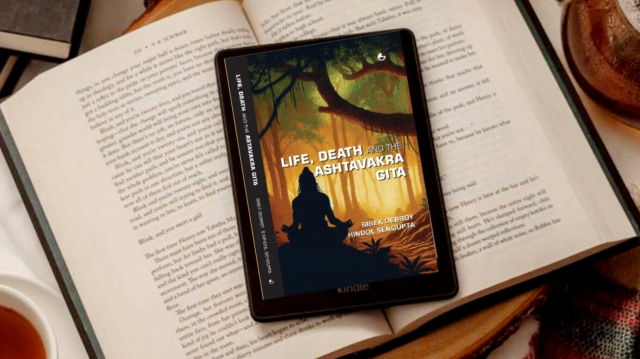Life, Death And The Ashtavakra Gita
By Bibek Debroy and Hindol Sengupta
This is one of those books that doesn't rush to get to a point. It sits quietly on your desk until you're ready to sit quietly with it. And when you do, it speaks softly, almost like it was always waiting for you.
Life, Death and the Ashtavakra Gita is not a typical spiritual book. It's not dramatic. It's not filled with catchy one-liners. It doesn't promise that your life will change. But page by page, it makes you pay attention to things you might have ignored for too long, like the difference between knowing and understanding, or between stillness and escape.
The book is structured in two parts. The first is a direct, no-nonsense translation of the Ashtavakra Gita by Bibek Debroy. The second is a deeply reflective interpretation by Hindol Sengupta, written during the pandemic...a time that gave him the space to really live with this text, not just read it.
Part One: The Text Stands Alone, So Does the Translation
The Ashtavakra Gita is unique. It isn't tucked away inside a longer epic or hidden in a storyline. It's a standalone text. A conversation between Ashtavakra and King Janaka. No battlefield. No parable. Just questions and answers. It's direct. It doesn't waste time setting a scene.
Bibek Debroy's translation mirrors that simplicity. One of the things I really liked is how the verses are presented cleanly — first in Sanskrit transliteration, then in English. No interpretation is pushed onto you. There's room to just read, and pause, and reread.
Here's one of the early shlokas that stayed with me:
“O son! If you desire mukti, cast aside material objects, as if they are poison. Like nectar, practise forgiveness, uprightness, compassion, contentment and truth.” (1.2)
It hit hard. Not because it was new, but because it was so calmly stated. The idea that freedom isn't found by chasing the right things, but by letting go of the need to chase anything at all.
Another shloka I kept coming back to:
“You are neither earth, nor water, nor fire, nor air, nor space. Know that you are the observer of all these and be free.” (1.3)
There's something incredibly peaceful about being reminded of that. That maybe the point isn't to control the elements of life, but to remember we are not them.
What stood out most in Debroy's approach was restraint. He doesn't explain more than necessary. There's a short note explaining why some Sanskrit terms have been left untranslated, and that decision feels respectful, not lazy. Words like jñāna, mukti, vairāgya don't get boxed into clumsy English versions. They're allowed to exist in their own depth.
Also read this review of 'Courageous Choices'
Part Two: Hindol Sengupta's Reflections: Personal, Deeply Thought Out
The second part of the book shifts tone completely. This is where Hindol Sengupta steps in with his voice. What begins as a reflection on reading the Gita during the lockdown slowly unfolds into a layered narrative of personal loss, historical curiosity, and philosophical inquiry.
What made this section memorable was how seamlessly it weaves emotion with study. It isn't just about grief or introspection. It's also about the evolution of thought. About how certain texts keep finding relevance in times of silence, uncertainty, or even despair.
Hindol doesn't write like a teacher. He writes like someone who has sat with a thought long enough to stop being scared of it. And then decided to write it down, not to teach it, but to make sense of it for himself.
His reflections on Advaita were especially striking. He doesn't break it down into a lesson. He observes it. Lives with it. Talks about what it felt like to read the Gita while also remembering his father. While questioning identity. While wondering whether surrender means withdrawal, or something else entirely.
One line that echoed through multiple chapters:
“The teachings do not aim to be special, but to cast aside desire for uniqueness…”
That stayed with me. Because it gently exposes how even in spirituality, there's a need to be someone, to stand out, to "get it." And here's a text reminding you that even that impulse can be let go.
Chapters That Echo
Some chapter titles in Hindol's section almost felt like journal entries. The Rope and the Snake, We Are All Trishankus, The Music of Nothingness. Each one approaches the same idea...the witness, the stillness, the dissolving of identity, but through different doors.
The Faith of My Father was especially moving. It doesn't give a big insight or resolution. It's quiet. It remembers. And that quietness made it more powerful.
There's also a recurring observation that Ashtavakra and Janaka were not in a teacher-student hierarchy. That the conversation was among equals. That simple insight changed the way I read the earlier part of the book. It turned the verses from instructions into exchanges.
What This Book Feels Like
This is not a book you underline. It's a book you close after a few pages and sit with. The silence around the words feels just as important as the words themselves.
It doesn't push you to become better. It doesn't insist that you change. It simply asks you to watch. To be the observer.
Reading it felt less like learning something new, and more like remembering something I forgot I knew.
And that's why it worked.
Something I Really Liked
There's a small section early on that talks about the uniqueness of this Gita:
“Of the stand-alone Gitas, the most famous is undoubtedly Ashtavakra Gita. It is a straight dialogue between Ashtavakra and King Janaka. It is a dialogue among equals.”
That simplicity of two minds meeting, without ornament or spectacle, sets the tone for everything that follows. It's not just scripture. It's presence. It's attention.
That's what I kept feeling while reading. Not inspiration. Not information. Just a kind of awareness.
Final Thoughts
I can't tell you what this book will do for you. But I can say that it gave me space. Not answers. Not direction. Just space. To think. To pause. To look at something that doesn't change, even when everything else does.
There's value in that.
Not every book needs to shift your world. Some books just hold your hand while you're shifting already. That's what this felt like.
And I'm glad I read it slowly.






